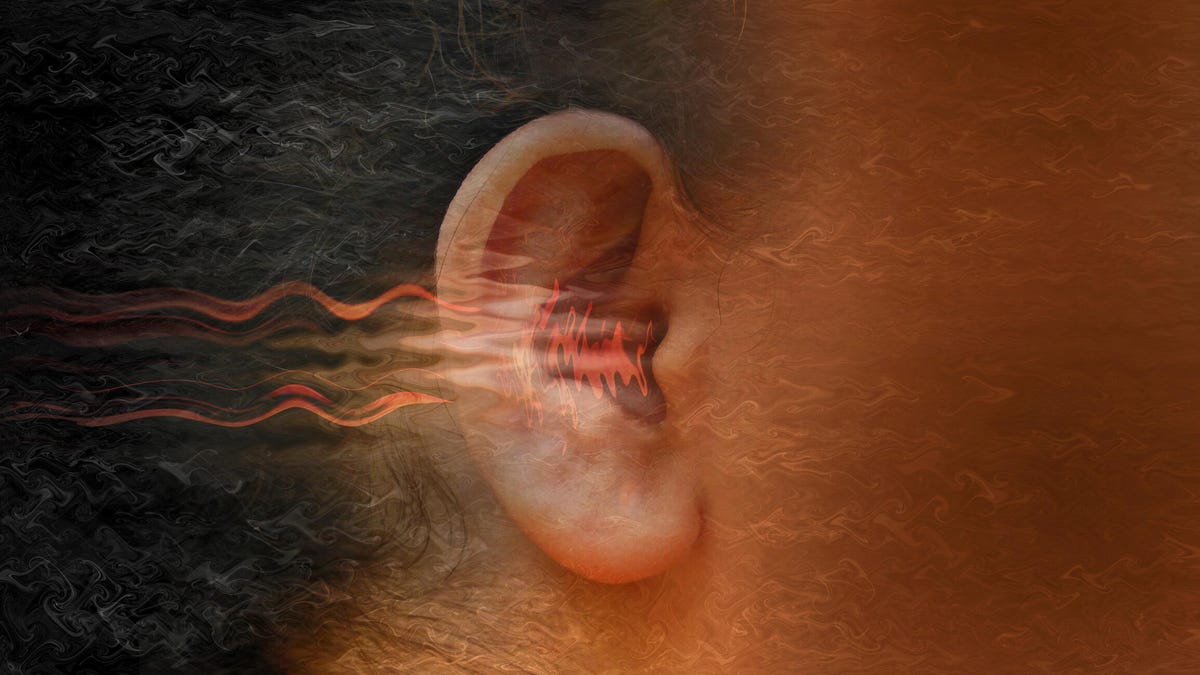 Why You Can Trust CNET
Why You Can Trust CNET Are Your Ears Ringing? 10 Ways to Manage Tinnitus
Tinnitus generally doesn't point to serious medical conditions, though the constant ringing can become irksome. Here's what to do about it.

A ringing in your ears that comes and goes isn't just an annoyance that makes it difficult to concentrate, it could be a sign that you have tinnitus. Tinnitus is a common condition marked by ear ringing with no external source. It's estimated that around 10 to 25% of adults experience it. It may sound like a soft or loud buzzing, whistling, roaring, sizzling or humming in your ears that you can't control.
If you have ringing in your ears, our guide can help. We'll outline what you should do when experiencing tinnitus and some of the treatment options your doctor might explore.
How to treat tinnitus
When you experience ringing in your ears, your first trip should be to your doctor. Your doctor will be able to carry out the tests to determine what's causing your tinnitus or they might refer you to an audiologist for hearing tests. Then, they'll outline a treatment plan that can help you manage it.
1. Treat the underlying condition
Often, tinnitus is a sign of an underlying medical condition, like an ear infection, ear blockage, TMJ, recent upper respiratory infection or a head or neck injury. Moreover, certain medications like NSAIDS, antibiotics and antidepressants can cause tinnitus to occur, according to the American Tinnitus Association. Your doctor can take a thorough health history to determine if your tinnitus might be from any of these causes.
2. Hearing aids
One of the most common causes of tinnitus is hearing loss, per the ATA. When you lose some of your hearing, your brain doesn't receive as much external stimuli from sounds. One theory is that your brain adapts to this new environment by filling in the missing frequencies, resulting in tinnitus.
If your tinnitus results from hearing loss, a hearing aid can help. A hearing aid is a small electronic device tasked with amplifying external sounds so your brain can process them, which relieves the internal noise of tinnitus. People with severe hearing loss may also be prescribed cochlear implants, which are like hearing aids but are surgically implanted.
3. Sound therapy
Since tinnitus sufferers require more external sounds to get relief, sound therapy is a common option to consider, according to the AARP. This can include white noise machines, playing soothing sounds through regular speakers or headphones, or even turning on an air conditioner to provide a white noise effect. You can find white noise playlists through many streaming music providers or use a white noise mobile app to receive the sound you want.
4. Custom masking devices
Custom in-ear masking devices provide a more personalized version of sound therapy, per the AARP. These devices resemble hearing aids, but they emit a low-level white noise specifically matched to your tinnitus. There are also some hearing aids that come with masking, the ATA reports.
5. Cognitive behavioral therapy
Stress can both worsen tinnitus and be a result of it, and tinnitus is associated with depression and anxiety, Healthline reports. Talk therapy can help with this aspect. It differs from sound therapy in that you're not working with the noise directly, but you're learning to cope and manage your emotional response to it. Over time, research shows that tinnitus patients using cognitive behavioral therapy experience an improvement in quality of life despite symptoms.
6. Tinnitus retraining therapy
Another option is to retrain your mind to get used to the tinnitus to the point that it's not bothersome anymore. Tinnitus retraining therapy involves cognitive behavioral therapy as well as a sound therapy component, involving low-level masking, according to the ATA.
7. Progressive tinnitus management
This is a multistep approach to tinnitus treatment that comes from the US Department of Veterans Affairs, according to Healthline. One step deals with educating the patient on tinnitus, while the next part involves speaking with a trained counselor or therapist once a week to learn to cope with difficulties arising from the condition. There might also be some form of sound therapy.
8. Stress management
Because stress and tinnitus are so related, learning to manage stress is a key part of dealing with symptoms. Your doctor or therapist might suggest activities that help reduce stress like exercising, doing yoga, meditating, making sure to get healthy sleep, journaling and more as part of your treatment. Mindfulness-based stress reduction is a common treatment technique that involves being fully aware and accepting of the present moment.
9. Anti-anxiety medicine or antidepressants
While there isn't one medication you can take to cure tinnitus, there are medications that can help in different ways. These include anti-anxiety drugs or antidepressants. Anti-anxiety medications can help with the stress or anxiety related to tinnitus. Meanwhile, some research has found that antidepressants might reduce your symptoms by suppressing the effects of the GABA neurotransmitter that is responsible for carrying sound signals to the brain, per Healthline. However, the link between GABA and tinnitus is not fully understood and requires more research.
10. Healthy habits
Healthy habits such as regular exercise, healthy sleep patterns, social connection, staying hydrated, eating well and limiting alcohol and smoking can all help make tinnitus more manageable by keeping you happy and healthy overall, the ATA reported.
